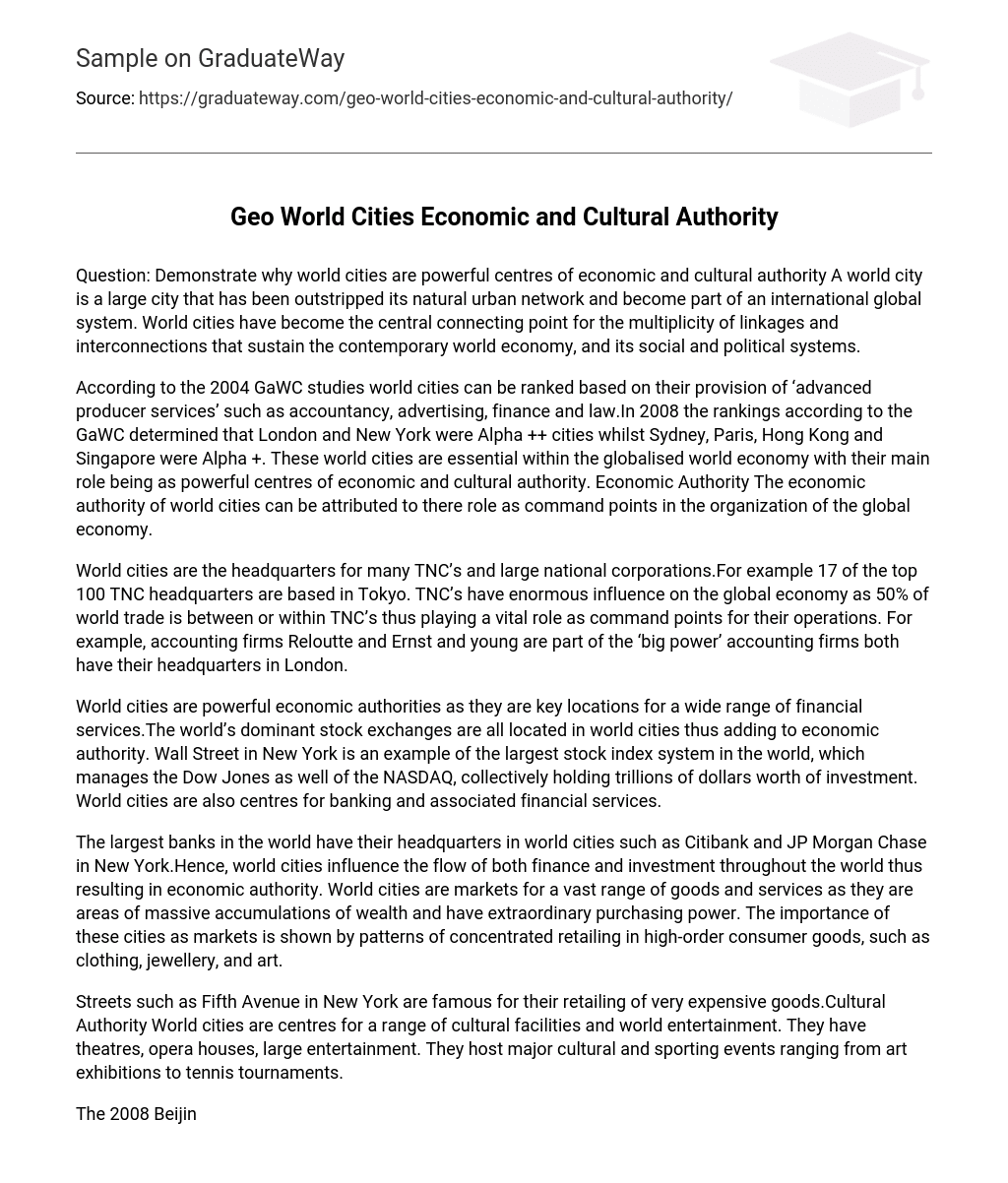The text highlights the importance of world cities as hubs of economic and cultural influence. A world city is defined as a large city that has surpassed its original urban network and joined the global system. These cities serve as vital connection points for the multitude of relationships and interdependencies that support the modern global economy, as well as its social and political structures.
According to the 2004 GaWC studies, world cities can be ranked based on their provision of ‘advanced producer services’ such as accountancy, advertising, finance, and law. In 2008, the GaWC rankings determined that London and New York were Alpha ++ cities, while Sydney, Paris, Hong Kong, and Singapore were Alpha +. These world cities are crucial within the globalized world economy, acting as powerful centers of economic and cultural authority. Their economic authority is attributed to their role as command points in the organization of the global economy.
World cities serve as the base for numerous TNC’s and major national corporations. Tokyo alone accommodates 17 of the top 100 TNC headquarters. TNC’s exert a significant influence on the global economy, with half of the world trade occurring between or within TNC’s. Consequently, they play a crucial role as command centers for their operations. London, for instance, houses renowned accounting firms Reloutte and Ernst and Young, both of which are part of the “big power” accounting firms.
World cities have a significant impact on the global economy as they function as crucial hubs for different financial services. These cities house the most influential stock exchanges in the world, thereby contributing to their economic dominance. For example, Wall Street in New York is widely recognized as the largest stock index system worldwide. It plays a key role in managing both the Dow Jones and NASDAQ, which collectively represent trillions of dollars in investment value. Furthermore, world cities serve as essential centers for banking and other related financial services.
World cities, including New York with Citibank and JP Morgan Chase as their headquarters, wield economic authority by influencing global finance and investment flow. These cities serve as lucrative markets due to their wealth accumulation and significant purchasing power. Concentrated retailing in luxury consumer goods, like clothing, jewellery, and art, further highlights the market significance of these cities.
Streets like Fifth Avenue in New York are renowned for their retailing of extremely costly items. World cities possess cultural authority and offer a variety of cultural facilities and global entertainment, including theaters, opera houses, and large entertainment venues. These cities are also known for hosting prominent cultural and sporting events that span from art exhibitions to tennis tournaments.
The 2008 Beijing Olympics and Fifa’s World Cup in Munich were both witnessed by more than a billion individuals worldwide. New York, for instance, holds significant cultural influence, as reported by the New York Times in 2010 when 48. million people visited the city, spending $31 billion. This signifies an increase of almost 7% compared to the 45 million visitors in 2009. Furthermore, New York houses various renowned establishments including the Museum of Modern Art and the Guggenheim, Broadway theaters, prestigious universities like Columbia and NYU, and artistic institutions such as the Julliard School and Lincoln Center.
The cultural authority of a world city comes from its ability to provide entertainment facilities, attracting tourists and boosting its economic authority. World cities have a major influence on culture by generating and spreading ideas, values, and shaping cultural development. They have a social infrastructure that promotes communication between people, facilitates information exchange, and encourages the formation of global social networks. Moreover, these cities include office buildings, international hotels, conference centers, luxurious residences, and distinctive architectural designs.
Sophisticated transport and information systems are essential for supporting the social structure of world cities. In London, for example, there is a wide selection of international hotels located in the West End. Furthermore, the advanced transport network includes the underground train system known as “the tube” and Heathrow International Airport. Similarly, world cities provide residents, workers, and visitors with a distinct cultural lifestyle. Tokyo stands out as an example with its renowned technologically advanced lifestyle where mobile phones can be used for making payments.
Known for its fast-paced lifestyle, the city of New York has earned the nickname “the city that never sleeps.” These dynamic cities are often seen as more advanced due to these characteristics. In summary, global cities have become influential centers of cultural and economic power. The rise of globalization and new technology has made it easier to transfer information, goods, and services on a global level. This enables these cities to maintain their dominance in trade, politics, and infrastructure. Consequently, they hold substantial economic and cultural authority.





